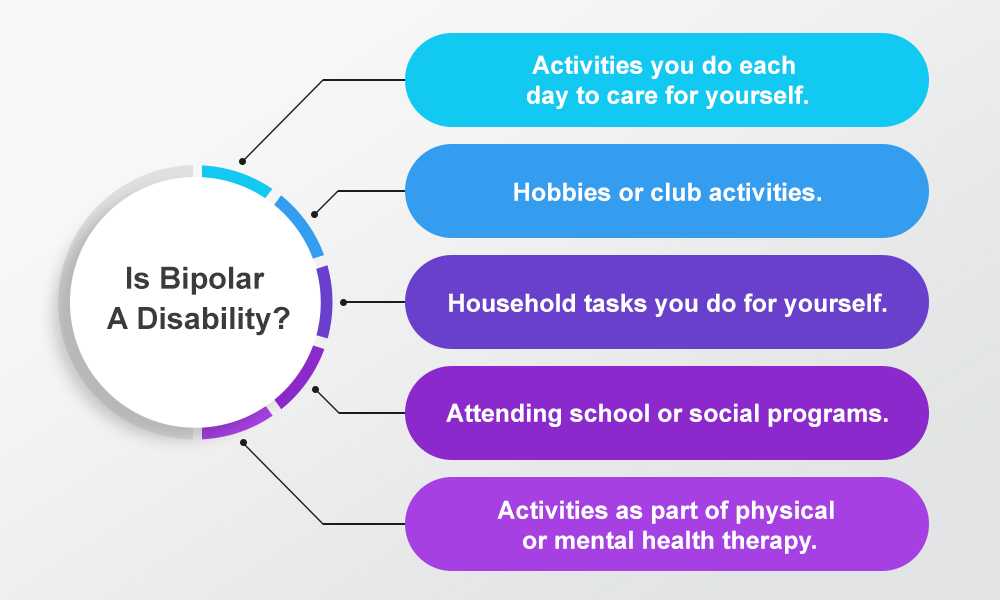Is Bipolar A Disability? Does Bipolar Disorder Qualify For Disability Benefits?
Coping with bipolar disorder, a mental health condition formerly known as manic depression can be challenging for individuals afflicted and their families. Among the many challenges is the financial pressure caused when bipolar disorder affects a person’s ability to work and earn a living.
“Is bipolar a disability?” is a common question people ask disability lawyers at the Clauson Law Firm, PLLC. This blog post answers the question with information about bipolar disorder. It also explains in detail how an individual diagnosed with it may qualify for disability benefits from the Social Security Administration through its Social Security Disability Insurance and Supplemental Security Income programs.
What Is Bipolar Disorder?
Bipolar disorder, formerly known as manic depression, is a mental health condition causing extreme mood swings ranging from manic highs to depressive lows. Individuals with bipolar disorder experience intense emotional states that can affect their ability to manage daily activities and relationships with other people at home and work.
The disorder manifests itself in two main phases: manic and depressive episodes. During a manic episode, individuals may feel euphoric, energetic, and overly optimistic. They may exhibit heightened creativity and increased productivity and engage in impulsive behaviors such as excessive spending or risky activities.
Conversely, during depressive episodes, individuals may feel overwhelming sadness and hopelessness. Someone with the disorder may lack interest in activities they once enjoyed. Additionally, they may struggle with insomnia or excessive sleeping, changes in appetite, and difficulty concentrating.
What Symptoms Are Associated With Bipolar Disorder?
An individual with bipolar disorder may experience manic, depressive, or mixed episodes lasting for a week or longer, with symptoms lasting throughout the day. Symptoms associated with a manic episode include the following:
- Feeling elated or displaying extreme irritability.
- Unusually active and feeling jumpy.
- Racing thoughts and speaking extremely fast.
- Sleeping less than usual.
- Risky behaviors and poor judgment.
The symptoms a person may exhibit during a depressive episode include the following:
- Feeling sad and hopeless.
- Self-isolation with feelings of loneliness.
- Slower than usual speaking combined with forgetfulness.
- Lack of energy.
- Needing more sleep than usual.
- Overeating or not eating enough.
- Loss of interest activities.
- Thoughts of suicide and death.
Someone experiencing a mixed episode will exhibit symptoms of manic and depressive episodes. For instance, a mixed episode may cause a person to feel jumpy and unusually active while simultaneously feeling hopeless and sad.
It’s crucial to note that bipolar disorder affects each person differently. For some, it may be manageable with medication and therapy. Still, other people may experience more profound challenges that interfere with daily life, making it difficult for them to continue performing work-related activities.
Is Bipolar A Disability?
The Americans with Disabilities Act classifies bipolar disorder as a disability to extend federal law protections to an individual diagnosed with it against workplace discrimination. Recognition by the ADA as a disability does not, however, mean that a person qualifies for disability benefits through SSI or SSDI. Federal law and regulations set different standards for a disability determination that allows for someone to receive disability benefits.
The SSI and SSDI provide benefits to people with bipolar disorder who cannot work due to their mental health condition. First, you must have a diagnosis from a qualified physician or other qualified medical or mental health professional confirming the symptoms that you experience from the disorder. The medical evidence also must detail the physical and mental impairments that prevent you from engaging in substantial gainful activity. The impairment or combination of impairments must last for at least 12 months or result in the person’s death.
Substantial gainful activity describes a certain level of work-related activities. There are two key components to look at. The first is that work activities must be “substantial,” which means the work requires you to perform significant mental and physical activities even if you only work part-time.
Activities must be “gainful,” meaning you receive pay or profit in return for doing them. For example, cleaning someone’s home as a favor without payment may involve substantial activities, but it would not qualify as gainful unless you received payment for doing them.

Federal regulations generally exclude the following activities as meeting the criteria for substantial gainful activity:
- Activities you do each day to care for yourself.
- Hobbies or club activities.
- Household tasks you do for yourself.
- Attending school or social programs.
- Activities as part of physical or mental health therapy.
Rather than rely on an evaluation of each activity to determine whether a person can engage in substantial gainful activity, the Social Security Administration uses monthly earnings less impairment-related work expenses.
Impairment-related work expenses are the services or items that your disability forces you to pay for to be able to work. An impairment-related expense must meet the following criteria to qualify for deduction when calculating monthly income:
- The expense must be for an item or service that makes it possible for you to work.
- You need the service or thing because of your disabling condition.
- You do not receive reimbursement for the expense.
The cost of what you need to work must be equivalent to the standard charge in the marketplace for the item or service.
If your net monthly earnings, earnings less disability-related expenses, in 2023 is $1,470 or more, you are engaging in substantial gainful activity. Individuals applying for disability benefits because of statutory blindness engage in substantial gainful activity when their 2023 net monthly income is $2,460 or more. If you are uncertain whether you meet the substantial gainful activity test to qualify for SSI or SSDI benefits, help is available in a free consultation with a disability lawyer at Clauson Law.
How Does Bipolar Qualify For Disability Benefits?
There are two ways to qualify for disability benefits for bipolar disorder. The first method is by meeting the criteria for one or more of the impairments contained in the listing of impairments compiled by the Social Security Administration.
The listing of impairments, commonly called the “Blue Book,” includes bipolar disorder in section 12.04 under affective disorders. It contains the requirements for a disability determination as a listed impairment.
The listing criteria are pretty extensive and require a history of at least two years of experiencing symptoms of bipolar disorder along with treatment of the condition. A successful application for disability benefits must be supported by proof that you cannot engage in substantial gainful activity, making it impossible to work because of meeting the listing criteria.
The assistance of a disability lawyer from Clauson Law makes the application process less stressful because you work with an experienced professional who knows and understands Social Security law and regulations. There is too much at stake to apply without first having a free consultation with a disability lawyer to learn how to meet the criteria required to have bipolar qualify for disability benefits.
What If I Did Not Meet The Listing Requirements For Bipolar Disorder?
If you cannot meet the requirements for the listing, do not give up. There are other ways to qualify for disability benefits with bipolar disorder. One way is with medical evidence in the form of notes of examinations, testing, and evaluations conducted by medical professionals proving that your condition exhibits the symptoms and severity equivalent to the listing impairment.
Another way to qualify for disability benefits is by proving that your symptoms prevent you from working. Social Security assesses your Residual Function Capacity (RFC). The RFC determines your work capacity in light of your medically determinable physical and mental health impairments. It assesses your ability to stand, sit, walk, climb steps, lift heavy objects, remember and follow instructions, work with others, and other mental, physical, and sensory work-related requirements.
Suppose your application and supporting medical records do not prove that you match or equal a listed impairment. In that case, Social Security reviews them using your RFC to determine if you can return to relevant work you did in the past. If you can, then you do not qualify for disability benefits.
However, suppose you cannot return to past relevant work. In that case, your claim is reviewed to determine whether there is other work available in the national economy that you may do based on your RFC, education, training, age, and work experience. Only if you cannot do other types of work will your application be approved.
You can increase the strength of your application for disability benefits by keeping a detailed record of your daily activities and how the symptoms of bipolar disorder that you experience affect you. Keep all appointments for doctor visits and follow the treatment plan prescribed for you. The failure to follow a treatment plan, including taking prescribed medications, that could make it possible for you to work may result in a denial of disability benefits.
Speak To An Exceptional Disability Lawyer
Learn more about how a Raleigh, NC, disability lawyer at the Clauson Law Firm can help someone with bipolar qualify for disability benefits. If applied and received a denial of benefits, we can appeal the decision and fight for your rights using the appeal process. Call Clauson Law now for a free consultation and case evaluation.


